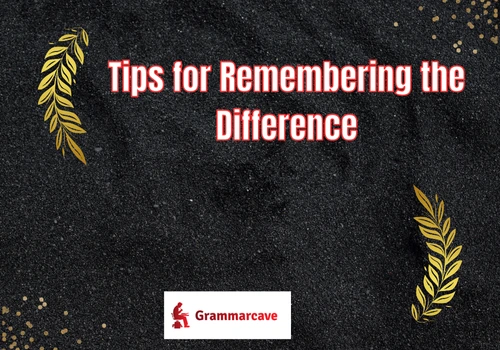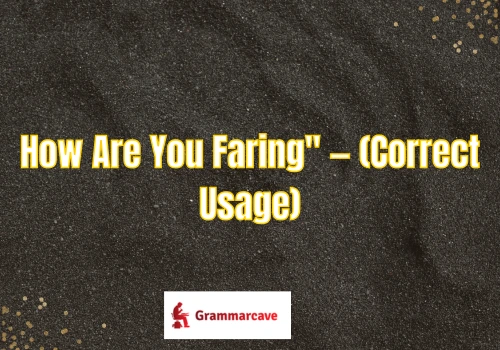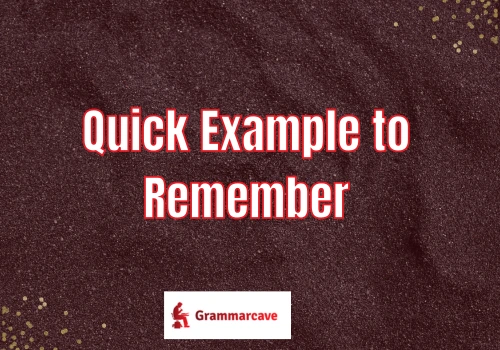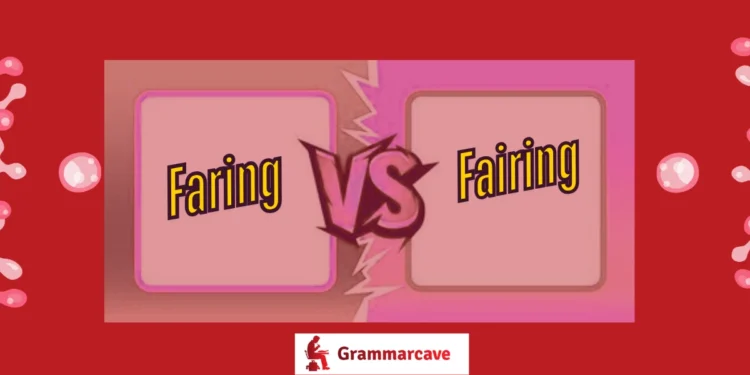Because the English language is so complicated, many words have similar sounds. The words “fairing” and “faring” have different meanings, but their sounds are similar. Despite their phonetic similarities, they are used in other contexts. It’s critical to distinguish between different forms of using words in both formal and non-formal situations.
Difference between Faring and Fairing
Though “faring” and “fairing” are nearly homophonous, they are not homophones and must be deployed according to their meanings. Knowing the difference between these two words will prevent you from making some typical errors and make you communicate more clearly. Be it “How are you?” or inquiring about the technicalities of a design, using the precise word will make a difference in your ability to express the message you intend to convey.
It is so important to distinguish between faring and fairing because they sound similar but have completely different meanings and usages. Both are used in quite different ways, and applying them correctly can make all the difference in how you write and converse.
“Faring”
“Faring” comes from the verb “fare,” meaning “get along” or “perform” in a particular situation. So when you say, “How are you faring?” you ask them how they’re doing, coping, or managing a specific problem. Fare comes from the verb fare, which means how someone is doing or handling something in particular. So if someone says, “How are you faring?” you ask them how they are doing or handling something specific. Fareing is also used to refer to how someone is doing or handling something.Also Read About Messege Vs Message.
The word is commonly used to describe someone’s general well-being, progress, or success in dealing with a particular challenge or circumstance.
“Fairing”
In technical or engineering contexts, “fairing” is primarily used. Its streamlined properties typically refer to bettering its structure or streamlining the shape of an object. It is used to reduce drag in vehicles, boats, or aircraft. Another way to understand “fairing” is that it is a technical term that is more reserved explicitly for engineering and design applications, referring to shaping or smoothing an object (usually to improve its aerodynamic efficiency), such as on vehicles, boats or aircraft (for example, a “fairing” is applied to an airplane to decrease drag about flight characteristics).
For example
Through the water, the boat’s fairing helped it glide smoothly.
During flight, the airplane’s fairing reduced air resistance.
In the above examples, “fairing” refers to physical components that contribute to the efficiency of machines or vehicles. It is not used to describe human experiences or well-being.
Key Differences
The difference between “Faring vs Fairing:
“Faring” refers to how someone is doing in a particular condition.
“Fairing”: Relating to a structural component used to smooth an object,
Awareness of the differences above will help you not confuse them and know which to use in a given context. Be it inquiring about how someone is or talking about the design of a car, understanding when to use faring or fairing is essential to accurately articulating your point.
“Fairing”
Meanwhile, “fairing” is limited to technical or engineering environments. It denotes a structure or part of a machine that has been made to be smooth, generally, to lower the object’s, for example, a car or a plane, aerodynamic drag. In transportation, fairings, like car ones, are usually employed to reduce drag and boost performance. Take this instance:
The fairing of the boat was instrumental in its smooth sail through the water.
The fairing of the airplane type of vehicle lessened resistance to the air when airborne.
In these instances, “fairing” stands for the equipment of a vehicle that adds more strength and efficiency to the vehicle or the machine. It is not used in the sense of an individual’s well-being or experience.
Main Differences:
The prime distinction between “faring” and “fairing” rests in the meanings and application of the words:
“Faring” is the way a person copes with a certain situation, often related to their well-being or progress.
“Fairing” is a component used to make something smoother or more streamlined. This method improves the object’s performance.
Recognizing these differences will help you prevent errors and properly apply each word according to the context. Whether it’s about human health or the vehicle’s design, knowing when to use “faring” or “fairing” ensures your message is clear and accurate.
1. In your new job, how are you faring?
Context: Questioning someone’s performance in a new job.
Question: “How are you doing in your new job? Are you getting along well?”
Usage Example (Faring): “I’m doing well in my new job, thanks for asking. The team is amazing!”
2. How is the Boat’s Fairing Affecting Performance?
Context: The conversation concerns changes made to a boat’s design without adding elements to the structure.
Question: “How is the boat’s fairing affecting performance?”
Usage Example (Fairing): “The boat’s fairing enables a great increase in speed, and also the boat can keep her balance in extreme weather conditions.”
3. How Are You Managing to Flee From The Accident?
Context: Getting to know how a given person’s health is faring.
Question: “How are you managing to flee from the accident? Are you getting better?”
Usage Example (Managing): “I’m managing quite well, although the recovery is not so swift.” That saved me a great deal of effort.
4. How Are You Managing To Overcome Challenges Regarding Your Mental Health?
Context: Trying to quantify someone’s emotional state.
Question: “How are you overcoming challenges regarding your mental health lately?”
Example (Managing): “I am managing much better after I started my therapy. It was very kind of you to ask me that.”
5. Is The Motorcycle’s Fairing Assisting In Cutting The Wind Noise?
Context: Trying to know what has been done to the motorcycle that has a bearing on the vehicle.
Question: “Is the motorcycle’s fairing reducing wind resistance?”
Usage Example (Fairing): “Of course, the fairing has facilitated my long rides considerably.”
6. How Are You Faring With Your Studies?
Context: Inquiring about academic progress.
Question: “How are you faring with your studies this semester?”
Usage Example (Faring): “I have been faring quite well legally, and I am still due my first law assignment.”
7. In Your Relationship, How Are You Faring?
Context: Find out about your friend’s romantic life. (Not good here)
Question: “How are things going with your relationship? Are you and your partner still on the right track?”
Usage Example (Faring): “We are doing okay but striving to be together more often.”
8. The Boat Speed Improved Because of the Fairing?
Context: A person is inquiring about increasing their boat’s speed.
Question: “Has the fairing on the boat helped with speed?”
Usage Example (Fairing): “Absolutely, the water is now cut much faster by the boat through the fairing.”
9. How Does the Fairing of a Hovercraft Affect Its Performance?
Context: Discussing performance elements of a hovercraft.
Question: “How does hovercraft fairing impact hovercraft performance?”
Fairing Usage Example: “The fairing allows the hovercraft to glide effortlessly over the different surface types.”
10. Has the fairing improved the speed of your bicycle?
Context: It is directly related, for example, to how aerodynamics on a bike will influence performance.
Question: “Has the fairing improved the speed of your bicycle?” could be posed.
Usage Example (Fairing): “Yes, the fairing reduces wind resistance, allowing me to go faster on straight roads.”
11. How Are You Faring in Your Career Development?
Context: How is work going for you?
Question: “How have you been developing?”
Example of use (Faring): “I’m faring quite well.” I’ve been working a lot lately.”
12. What’s the Impact of the Fairing on the Race Car’s Speed?
Context: Asking about making changes to a car for racing.
Question: “How does the fairing affect the race car’s speed?”
Usage Example: “Better aerodynamics from the fairing make the car quicker on the track.”
13. How Are You Faring After Your Breakup?
Context: Asking a friend how they are coping after a breakup.
Question: “How are you doing post-break-up?”
Example of Use (Faring): “I’m faring better each day, though it’s still difficult.”
14. How Does the Fairing Help the Aerodynamics of an Aircraft?
Context: “fairing” about aircraft.
Question: How Does the Fairing Help the Aerodynamics of an Aircraft?
Example Usage Fairing: “The fairing helps air flow more smoothly over the aircraft and decreases drag.”
15. How Are You Faring With the New Technology at Work?
Context: Asking about adaptation to new systems or tools at work.
Question: “How are you faring with the new update at work?”
Usage Example (Faring): “I’m faring well, though I’m studying some of the new features.”
16. How Has the Fairing Helped Better Your Vessel’s Performance?
Context: Discussing performance modifications on a vessel.
Question: “How has the fairing helped improve your vessel’s performance?”
Usage Example (Fairing): “It creates a big difference in how the vessel handles during rough seas.”
17. How Has the Fairing Improved the Speed of Your Motorcycle?
Context: Inquiring about performance changes in a motorcycle.
Question: “How has the fairing improved the speed of your motorcycle?”
Usage Example (Fairing): “The fairing has made my control more logical, reducing wind drag seriously.”
18. How Are You Faring with Your Finances This Year?
Context: Exploring someone’s financial situation.
Question: “How are you faring with your finances this year?”
Usage Example (Faring): “I’m faring well. I’ve been an expert at saving more than last month.”
19. How Does the Fairing of a Rocket Affect Its Launch?
Context: Consider rocket components in space study.
Question: “How does the fairing of a rocket affect its launch?”
Usage Example (Fairing): “The fairing protects the weight from aerodynamic pressure during launch.”
20. How Are You Faring in Your New Relationship?
Context: In a new romantic relationship, ask about progress.
Question: “How are you faring in your new relationship?”
Usage Example (Faring): “We’re faring badly; it’s still early, but things are going bad.”
21. How Does the Fairing Improve the Boat’s Speed?
Context: Talking about the reduction to improve the speed of a boat.
Question: “How does the fairing improve the boat’s speed?”
Usage Example (Fairing): “Allowing the boat to go faster.”
The fairing reduces resistance in the water.
22. How Are You Faring With Your Recovery?
Context: Someone’s recovery after an injury or illness.
Question: “How are you faring with your recovery?”
Usage Example (Faring): “Still need to take it easy. I’m faring well.”
23. How Has the Fairing Helped the Aircraft in Terms of Efficiency?
Context: Asking about efficiency improvements in aviation.
Question: “How has the fairing helped the aircraft in terms of efficiency?”
Usage Example (Fairing): “The fairing improves fuel efficiency by reducing drag, making longer flights more economical.”
24. How Does the Fairing Help the Boat During Stormy Weather?
Context: Discussing the role of fairing in ensuring boat safety in adverse conditions.
Question: “How does the fairing help the boat during stormy weather?”
Usage Example (Fairing): “The fairing helps maintain stability and keeps the boat from rocking too much in rough seas.”
25. How Are You Faring in the Competitive Market?
Context: Asking about someone’s business or career success in a competitive field.
Question: “How are you faring in the competitive market?”
Usage Example (Faring): “We are faring well, though the competition is fierce, we’re keeping up with trends.”
26. How Does the Fairing on a Jet Ski Help in Water Sports?
Context: The fairing’s relation to a smoother watercraft riding experience.
Question: “What role does the fairing on a jet ski play during water sports?”
Usage Example (Fairing): “The fairing reduces drag, enabling the jet ski to slide over the water’s surface more smoothly.”
Example of Use (Faring): “I’m faring well, although it’s taking longer than I thought.”
27. How Does the Fairing of a Glider Help With Long Flights?
Context: Gliders have an aerodynamic advantage at this last point of the fairing.
Question: “What does a glider’s fairing do to assist long flights?”
Usage Example (Fairing): “The fairing minimizes drag and enables the glider to remain in the air longer.”
28. How Are You Faring With Your New Baby?
Context: Returning to the subject of asking someone if they have children.
Question: “How are you faring with your new baby?”
Usage Example (Faring): “I’m faring okay, though it’s been an adjustment getting used to the sleepless nights.”
29. How Does the Fairing Affect a Ship’s Speed in Open Waters?
Context: Discussing the design aspects of a ship to have more speed on the open sea.
Question: “How does the fairing affect a ship’s speed in open waters?”
Usage Example (Fairing): “It reduces water drag and allows the ship to higher speeds.”
30. How Does the Fairing on a Snowmobile Improve Performance?
Context: Because you can make your snowmobile faster and more fun.
Question: “How does the fairing on a snowmobile improve performance?”
Usage Example (Fairing): “The fairing creates less wind drag so that the snowmobile can go faster.”
31. How Are You Faring With Your Volunteer Work?
Context: During an interview, ask a volunteer about their experience.
Question: “How are you faring with your volunteer work?”
Usage Example (Faring): I am faring well. “It has been fun to help at the shelter.”
32. How Are You Faring in Your Retirement?
Context: Asking about life changes after retirement.
Example Question: “How are you faring now that you’re retired?”
Usage Example: “I’m faring quite well, enjoying my hobbies, and spending more time with family.”
33. Has the Fairing Improved the Stability of Your Drone?
Context: Talking about drone design improvements.
Example Question: “Has the new fairing helped stabilize your drone during windy flights?”
Example: “Yes, the fairing has reduced drag and made my drone much steadier.”
34. How Are You Faring After Moving to a New City?
Context: Checking on emotional adjustment after relocation.
Example Question: “How are you faring after your big move to Chicago?”
Example: “I’m faring okay, but still getting used to the new environment.”
35. How Does the Fairing Impact the Energy Efficiency of a Solar Car?
Context: Discussing eco-friendly vehicle performance.
Example Question: “How does the fairing improve your solar car’s energy use?”
Example: “The fairing decreases wind resistance, helping the solar car conserve energy and go farther.”
36. How Are You Faring With Your Fitness Journey?
Context: Motivating someone to share their fitness progress.
Example Question: “How are you faring with your gym routine lately?”
Example: “I’m faring well — I’ve lost 5 pounds and feel stronger!”
37. How Is the Fairing Design Helping the Aircraft During Takeoff?
Context: Aviation performance focus.
Example Question: “Is the new fairing design making takeoffs smoother?”
Usage Example: “Definitely — it helps cut through the air better, so we lift off with less drag.”
38. How Are You Faring With Your Side Business?
Context: Talking about managing a second job or hustle.
Example Question: “How are you faring with your small business on Etsy?”
Usage Example: “I’m faring great — orders have doubled this month!”
39. How Does Fairing Help Electric Scooters Perform Better?
Context: Technology improvements for personal transport.
Example Question: “Does the scooter’s fairing improve ride quality?”
Example: “Yes, the new fairing reduces wind resistance, giving me better speed and battery life.”
40. How Are You Faring With Balancing Work and Family?
Context: Checking in on work-life balance struggles.
Example Question: “How are you balancing work and your kids?”
Example: “I’m faring better now with a strict schedule.”
41. How Does the Fairing Benefit High-Speed Trains?
Context: Engineering improvements in transport.
Example Question: “How does fairing help high-speed trains?”
Usage Example: “The fairing streamlines the train’s shape, letting it move faster with less energy use.”
42. How Are You Faring After a Major Surgery?
Context: Health and recovery inquiry.
Example Question: “How are you faring after your knee surgery?”
Example: “Recovery’s tough, but I’m faring better every week.”
43. How Does Motorcycle Fairing Improve Fuel Efficiency?
Context: Discussing modifications to bikes.
Example Question: “Does your bike’s fairing help with gas mileage?”
Usage Example: “Yes! I get a few more miles per gallon with less air resistance.”
44. How Does the Fairing Help Protect Spacecraft During Launch?
Context: Space technology and protection.
Example Question: “How does the rocket’s fairing work during takeoff?”
Usage Example: “It shields delicate instruments from wind and heat until they reach space.”
45. How Are You Faring After Adopting a Pet?
Context: Life changes with a new pet.
Example Question: “How are you faring now that you’ve adopted a puppy?”
Example: “It’s exhausting but wonderful — I’m faring better each day.”
46. How Does the Fairing on a Boat Help During Rough Waters?
Context: Discussing boat modifications.
Example Question: “Does the new fairing help in bad weather?”
Example: “Absolutely — the boat stays more stable and cuts through waves smoothly.”
47. How Are You Faring in Learning a New Language?
Context: Language acquisition progress.
Example Question: “How are you faring with your Spanish lessons?”
Example: “I’m faring well, already holding basic conversations!”
48. How Does Fairing Help Racing Bicycles Perform?
Context: Sports and performance gear.
Example Question: “Does the aerodynamic fairing help in races?”
Usage Example: “Definitely, I can sprint faster with less wind pushing against me.”
49. How Are You Faring With Remote Work?
Context: Adjustment to working from home.
Example Question: “How are you faring now that you’re remote full-time?”
Example: “I’m faring great — love the flexible hours!”
50. How Does the Fairing Improve the Speed of Cargo Ships?
Context: Marine engineering improvements.
Example Question: “Is fairing important for big ships?”
Usage Example: “Yes, it helps them glide more smoothly, saving on fuel and time.”
51. How Are You Faring During the Economic Downturn?
Context: Financial coping mechanisms.
Example Question: “How are you faring with the tough economy?”
Usage Example: “I’m hanging in there — cutting costs where I can.”
52. How Does the Fairing Protect Satellites During Launch?
Context: Aerospace engineering.
Example Question: “How important is fairing for satellite safety?”
Example: “It’s critical — it shields delicate parts from vibration and heat.”
53. How Does Fairing Help Make Trains More Eco-Friendly?
Context: Green transport innovations.
Example Question: “Does train fairing affect environmental impact?”
Example: “Yes — it cuts energy use by reducing air resistance.”
54. How Are You Faring After a Long-Term Project Completion?
Context: Post-project emotional recovery.
Example Question: “How are you faring after finishing that huge assignment?”
Usage Example: “Relieved and proud — finally catching up on rest.”
55. How Does the Fairing Enhance Bicycle Performance in Triathlons?
Context: Athletic gear optimization.
Example Question: “Does fairing help triathlon bikes go faster?”
Usage Example: “Absolutely — every second counts in races!”
56. How Are You Faring After a Major Life Change?
Context: Emotional adjustment after significant shifts.
Example Question: “How are you faring after the big move?”
Usage Example: “Still adjusting, but getting stronger every day.”
57. How Does the Fairing Affect Drag on a Racing Yacht?
Context: Competitive sailing upgrades.
Example Question: “Does yacht fairing matter in races?”
Usage Example: “Big time — less drag means faster finishes.”
58. How Are You Faring, Balancing Two Jobs?
Context: Managing multiple work commitments.
Example Question: “How are you faring working two jobs?”
Usage Example: “It’s tough, but I’m staying organized and managing.”
59. How Does Fairing Improve Jet Fighter Maneuverability?
Context: Military aviation.
Example Question: “Does fairing help fighter jets perform better?”
Usage Example: “It reduces drag so pilots can turn quicker and move faster.”
60. How Are You Faring With Your Creative Projects?
Context: Checking artistic productivity.
Example Question: “How are you faring with your painting and writing?”
Usage Example: “I’m faring well — inspiration is finally flowing again!”
Tips for Remembering the Difference

Here are some helpful tips for remembering the difference between “faring” and “fairing”:
Think of the context:
“Faring” refers to how someone is doing or progressing in a situation. It’s about well-being or performance.
Tip: If you’re discussing a person’s condition or progress, the word “faring” is the one you want.
Example: “How are you faring in your new job?”
“Fairing” is a noun or verb used in technical contexts and is associated with engineering, design, or the shaping of objects.
Tip: If you’re discussing streamlining or a component of a vehicle or aircraft, think of “fairing.”
Example: “The boat’s fairing reduced drag for better speed.”
Mnemonic:
For “faring,” think of “fare” (as in “how you fare” or “how you’re doing”), which will remind you it’s about doing or progressing in a situation.
For “fairing,” remember that it has an “engineered” sound because it is associated with the structure of something (like a boat or plane).
“Faring” = Feeling or Functioning:
If you’re asking someone how they’re feeling or functioning in a situation, “faring” is the word to use.
Example: “How are you faring in the competition?”
“Fairing” = Form or Function:
If you’re talking about a physical structure, particularly in streamlining or engineering, use “fairing.”
Example: “The aircraft’s fairing helped improve its speed and aerodynamics.”
Summary of Differences
“Faring” (correct) is about how someone is doing or progressing.
“Fairing” (incorrect in this context) is a noun for a covering or part of a vehicle.
Correct Version
“How are you faring?” is the right way to ask how someone is doing or coping with a situation.
I hope that helps clarify the confusion. Let me know if you’d like more examples or explanations.
Unraveling the Meaning: “How Are You Fairing” or “Faring”? Examples and Clarifications
Of course! Here’s a clear and organized breakdown:
Unraveling the Meaning: “How Are You Fairing” or “Faring”? — Examples and Clarifications.
1. Correct Phrase: “How Are You Faring?”
Meaning:
Asking someone how they are doing, managing, or coping with a situation.
Clarification
“Faring” comes from the verb “fare,” meaning performing, getting along, or progressing.
Example
“How are you faring in your new job?”
“After the surgery, he is faring better than expected.”
“The team fared well despite the tough competition.”
Usage Tip
Use faring when asking about someone’s state, condition, or success over time.
2. Incorrect Phrase (in this context): “How Are You Fairing”
Meaning
“Fairing” is a noun, not a verb. It refers to a smooth structure on vehicles (like motorcycles, planes, or bicycles) designed to reduce drag or protect from the wind.
Clarification
If you’re not talking about vehicle parts, “fairing” is wrong.
Examples
“The motorcycle’s fairing cracked after the accident.”
“Aircraft fairings improve aerodynamics and save fuel.”
Usage Tip
Fairing = Physical part of a machine, not a person’s progress or feelings.
Quick Memory Trick:
Faring → How you are feeling or progressing.
Fairing → Fair parts for airplanes or motorcycles.
Final Clarification
✅ “How are you faring?” — Correct
❌ “How are you fairing?” — Incorrect (unless you’re checking on a motorcycle part!)
Comparing the Phrases: “How Are You Fairing” or “Faring”? Differences and Real-life Examples
Here’s a clear comparison you can use:
Comparing the Phrases: “How Are You Fairing” or “Faring”? – Differences and Real-life
Examples
1. “How Are You Faring” — (Correct Usage)

Meaning:
Asking someone how they are doing, coping, or progressing.
Origin:
The verb “fare” means to get along, succeed, or manage.
Real-life Examples:
A friend asking after a move:
“Hey! How are you faring in your new city?”
Teacher checking on a student:
“How are you faring with your final exam preparations?”
During a crisis:
“How are you faring after the storm? Is everything okay?”
Quick Tip:
If you’re checking on someone’s feelings, progress, or condition, use faring.
2. “How Are You Fairing” — (Incorrect in This Context)
Meaning:
“Fairing” is a noun that refers to a smooth covering on vehicles like motorcycles, airplanes, or bicycles — it has nothing to do with how someone is doing.
Real-life Examples (Correct Context for “fairing” ):
Talking about a motorcycle:
“I had to replace the front fairing after the crash.”
In aviation maintenance:
“The aircraft’s fairing needs to be inspected for damage.”
Quick Tip
Fairing makes sense if you’re talking about vehicles or machine parts—not when asking about a person’s well-being.
Correct/Incorrect
Meaning
Example
How are you faring?
✅ Correct
Asking how someone is doing/coping
“How are you faring in your new job?”
How are you faring?
❌ Incorrect
(Refers to vehicle parts, not emotions)
“The motorcycle’s fairing was scratched.”
✅ Use “How are you faring?” to ask about someone’s condition.
❌ Don’t use “fairing” unless you’re talking about vehicles!
15 Points About Using “How Are You Fairing” or “Faring”
✅ Points about “How Are You Faring” (Correct Usage)
- Example: “How are you faring after the surgery?”
- “Faring” relates to handling challenges, life changes, or hardships.
- Every day, there is both formal and informal communication.
- Used in many contexts — health, work, studies, travel, and emotional life.
❌ Points about “How Are You Fairing” (Incorrect Usage)
- “Fairing” is a word that can only be considered a noun. It certainly does not serve as its verb form.
- Not only does “fairing” serve as a noun but also as a motorcycle accessory – its very purpose is to cover the internal parts
- An example is, “The motorcycle’s fairing protects the rider from the wind” (which could serve as an example).
- Every non-native speaker would accept, “How are you faring?” as a question and not an inquiry until you consider you are looking to get told about a vehicle’s fairing (something unlikely with most people alive).
- It’s replacing “faring” with a fairing that makes the sentence illogical and meaningless.
- “Fairing” is not interchangeable with “faring” in the context of feelings, “professionals,” or “societal references.”
- Using “fairing” when talking about people conveys an impression of oncoming difficulty with spelling or grammar.
- This blunder could go undetected by spell-check features since the word “fairing” is legitimate and renders purpose; context, however, changes the matter.
- Always double-check context: is the man talking about a person (faring) or a machine (fairing)?
- “Faring” = form of feeling
- “Fairing” = coverings of vessels needing a streamlined silhouette
Quick Example to Remember:

Situation
Correct Phrase
Example
Asking about health
Faring
“How are you faring after your illness?”
Talking about motorcycle parts
Fairing
“The bike’s fairing needs repair.”
FAQs
1. How can I remember the difference easily?
Memory Trick:
Faring = How you’re feeling.
Fairing = Covering parts of vehicles.
“Fare” and “faring” have been used since Middle English times.
Example from old usage: “How dost thou fare?”
2. Can “faring” be used when discussing businesses or countries?
✅ Yes!
Example: “How is the economy faring during the crisis?”
3 . What’s the best way to remember the difference between “faring” and “fairing”?
Great question!
A good trick is
“Faring” = Feelings or doing well/poorly (people, situations).
“Fairing” = A smooth covering on vehicles (like a fair surface).
Just think: “Faring” is about life and people, while “fairing” is about machines.
4. I’m unsure if I’m using “faring” correctly—can you give me some real examples?
For sure! Here are a couple of examples:
“How’s your friend faring after the accident?” (This asks how they’re doing emotionally or physically after something challenging.)
“How are you faring with your new business?” (Asking how well someone is managing or progressing with their business.)
On the other hand:
“The fairing on the bike was cracked after the crash.” (That’s about a part of a bike or vehicle!)
Does that help clarify it?
Conclusion
Understanding “How Are You Faring” vs. “Fairing”
Recognizing the distinction between “How are you faring?” and “How are you fairing?” is not as difficult as it seems after one examines their meanings and usage contexts.
The word ‘faring’ strictly concerns how someone does, manages, or copes with a situation. This word applies to people and situations, whether it be their physical or emotional state or their progress in life.
Example: “How are you faring with the new job?”
On the other hand, ‘fairing’ pertains to the smooth, protective cover that goes on vehicles, such as planes, bikes, or cars. It is a more technical word concerning machines or modes of transport.
Example: “The fairing on my motorcycle was damaged in the crash.”
Takeaways:
“Faring” = people, situations, and emotions.
“Fairing” = Machines, vehicles, and protective coverings.
Both words serve the same function due to their similar sounds, but all differences are essential in English. Remembering these will enable one to avoid unfortunate errors with precision.
This straightforward guide is helpful whether you are talking with a friend, writing an email, or engaging in a more technical discussion. It will help you pick the correct phrase and sound confident.
Remember that English is about practice and learning from your mistakes. Keep applying what you have learned, and you will grasp it easily.








